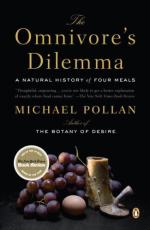|
This section contains 635 words (approx. 2 pages at 400 words per page) |

|
Chapter Seventeen Summary and Analysis
In chapter seventeen, Pollan attempts to eat a steak while reading Peter Singer's Animal Liberation, a book about the ethics of eating meat. Pollan notes that the issue of meat eating has been highly public as vegetarianism has become popular, and animals rights activists have highlighted the unethical treatment of animals in CAFOs. Singer's fundamental argument is that assuming a higher degree of intelligence in humans does not equate to a right to use others for out own ends. Therefore, why does a lack of intelligence in animals allow us to use them for our own ends? Jeremy Bentham, a philosopher, used the argument for marginal cases to argue a similar point. In his argument, there are humans whose mental functions are not even that of a chimp. We still include those individuals in our moral circle, so why...
(read more from the Chapter Seventeen Summary)
|
This section contains 635 words (approx. 2 pages at 400 words per page) |

|




